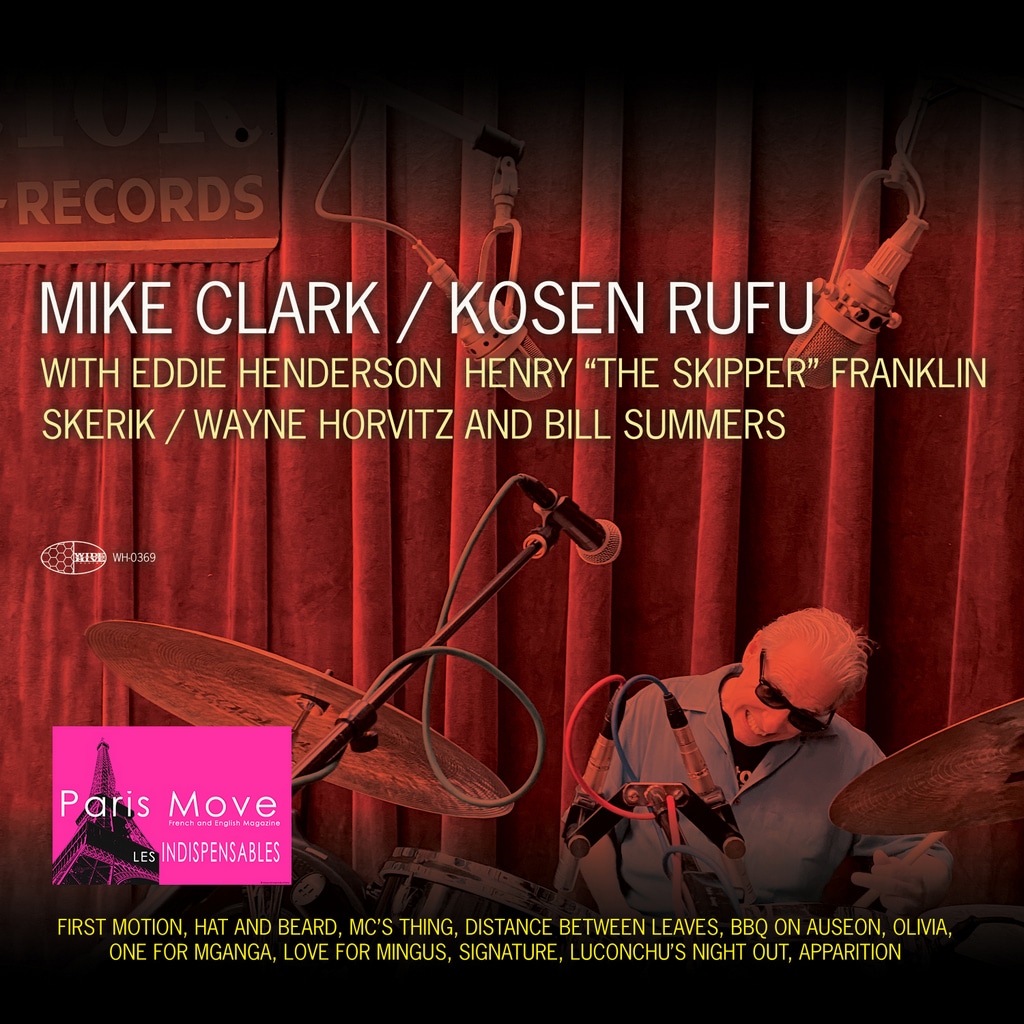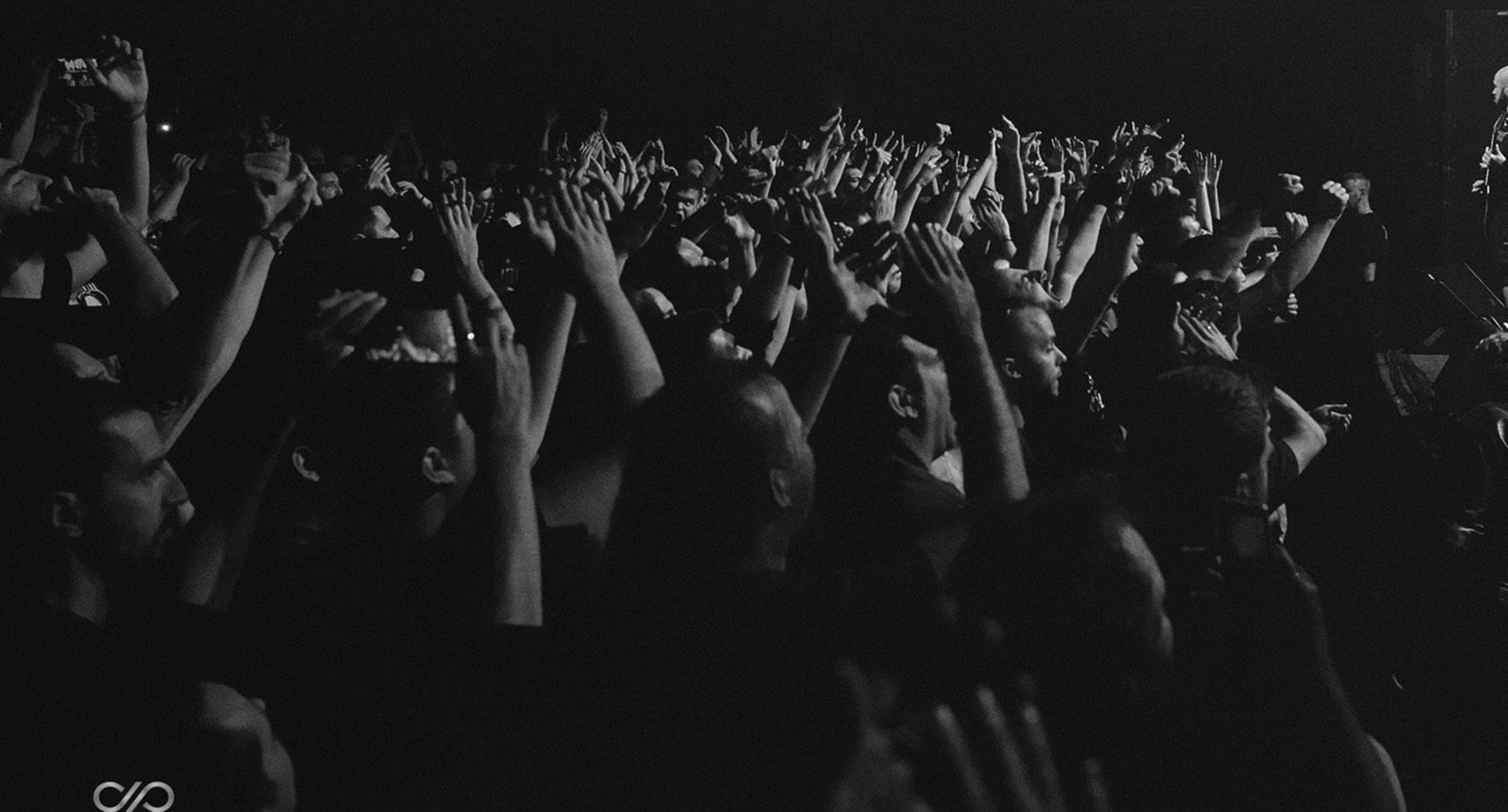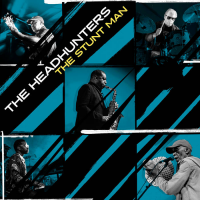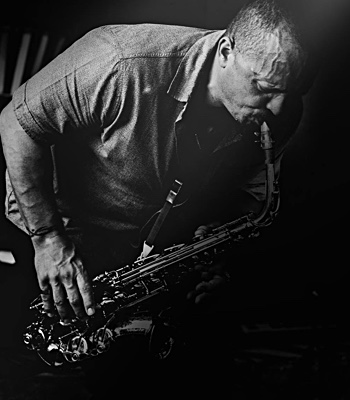Press
The Headhunters: The Stunt Man
With the half-century anniversaries of Herbie Hancock‘s work with The Headhunters having passed in roughly the last year—Head Hunters (Columbia, 1973) and Thrust (Columbia, 1974)—it is appropriate the current configuration of the group has continued regular activity. In fact, under the fitting tutelage of drummer Mike Clark and percussionist Bill Summers, the band has issued two albums of new material in this span of time.
Speakers in the House (Ropeadope, 2022) is an album of dashing panache and The Stunt Man successor is likewise impressive. Recorded at Hyde Street Studios in San Francisco in August 2023, it features seven selections, five self-composed by the members of current quintet plus a pair of ambitious covers; George Gershwin’s “Embraceable You” appears in a sinuous rendition led by Donald Harrison‘s slinky alto saxophone and Wayne Shorter‘s “ESP” features Harrison and guest tenor saxophonist Craig Handy engaging in tandem playing as spirited as it is smooth.
Given the disparate sources for these compositions, the continuity of The Stunt Man is remarkable. But then, this deceptively ambitious program incorporates the visceral motion of the fivesome, a factor mirrored in the expertly pacing of the track sequence. The mixing by Chris McGrew—who co-produced with Clark and Summers—figures in here too, as does the mastering by Michael Romanowski: the engineers’ attention to detail is as striking as the technical expertise that permeates the musicianship.
That meticulous approach extends to the LP’s duration of approximately thirty-seven minutes. Such a running time ensures optimum audio quality for all configurations of the album, especially the vinyl edition, and true-to-life sonics are indispensable virtue for such dense arrangements. On keyboardist Kyle Roussel‘s “Attitude of Gratitude,” for instance, the piano notes radiate a presence as tangible as the synthesizer lines, both textures of which are comparable to the timbre of the bass. Meanwhile, the tactile quality of Clark’s rhythm patterns on his drum kit matches Summers’ on the congas and, in turn, Chris Severin’s on the bass.
As with Harrison’s “The Sand Castle Headhunter” (the longest track here at just over nine minutes) and keyboardist Kyle Roussel’s “Attitude of Gratitude,” the latter rightfully hints at some measure of spiritual enlightenment. In contrast, the potential impact of album closer, Summers’ “New Levels, New Devils,” ends up diminished by its glib lyrics and superfluous vocals (fortunately it is less than three minutes long).
Upon release of Manchild (Columbia, 1975), the last of the original triptych of Hancock/’Hunters LPs, no one might have thought the band and its music would continue to be a going concern close half-a century later. How propitious it is then, to hear the invigorating artistry of the group circa 2024 on The Stunt Man.

By Doug Collette
October 11, 2024
Mike Clark – Kozen Rufu
If you don’t appreciate albums that delve too deep into musical experimentation, then this might not be for you. For the rest of you, grab your napkin and fasten it around your neck, because with the feast that’s on offer, you’re in for a treat. Featuring legendary drummer Mike Clark accompanied by Eddie Henderson on trumpet, Henry ‘The Skipper’ Franklin on bass, Skerik on saxophone, Wayne Horvitz on piano and Rhodes, and fellow Headhunter Bill Summers on congas and percussion.
Mike Clark is an intriguing drummer for whom jazz is his first love, and on this album, he explores themes seen through his ultra-contemporary musical perspective. The choice of other artists who make up this group solidifies the musical style that Mike embarked upon with this album.
Mike has performed with jazz luminaries such as Herbie Hancock, Christian McBride, Chet Baker, John Scofield, Nicholas Payton, Tony Bennett, Wayne Shorter, Joe Henderson, Eddie Henderson, Bobby Hutcherson, Vince Guaraldi, Woody Shaw, Donald Harrison, Albert King, Larry Coryell, Mike Wolff, Wallace Roney, Billy Childs, Dr. Lonnie Smith, Chris Potter, Bobby McFerrin, Nat Adderley, Oscar Brown Jr., and Gil Evans and his orchestra.
Throughout this album, the entire group leans heavily on rhythm. It’s a constant balance between a form of elevated classic jazz and ultra-contemporary jazz. Skerik on saxophone shines like a shooting star on every track, Eddie Henderson on trumpet always seems poised on a tightrope, and so we listen, we admire. Mike Clark blurs the lines, playfully offering us exquisitely crafted rhythms that make the sound of the instruments bounce like balls on a ping-pong table.
As you can see, this album is set to release in early September, and believe me, the month of September will be filled with exceptional albums like this one. We are also eagerly anticipating releases from Celine Bonacina, Aaron Diehl & The Knights, the new Veronica Swift, and quite a few others. Even in October, the new Steve Cole album is on the horizon.
Clearly, “Kozen Rufu” can only be a selection for the Must-Have list at Bayou Blue Radio and Paris-Move editorial teams, for whom this CD is an exceptional album.

Thierry De Clemensat
PARIS-MOVE, August 16th 2023
'Mike Clark Plays Herbie Hancock'
Drummer Mike Clark presents another tour-de-force recording featuring music by the legendary Herbie Hancock.
His latest CD titled ‘Mike Clark Plays Herbie Hancock’ also features Jon Davis on Piano and Leon Lee Dorsey on Bass.
When Mike envisioned this project he sought out long-time collaborators Davis and Dorsey who can easily adapt to any stylistic challenges while always swinging.
All eight tracks feature Mike’s unmistakable ride cymbal sound. This includes: ‘Toys’ – ‘Dual Force’ – ‘Chan’s Song’ – ‘Sorcerer’ and –‘Empty Pockets’. The Latin flavored ‘Speak Like a Child’ and the delicate brushwork on ‘Dolphin Dance’ feature aural delicacy. ‘Actual Proof’ presents a compare and contrast drum lesson with the 1974 original.
The trio began recording in June of 2022 at Manhattan Sky Studios in New York City. Most of the tunes were recorded in one or two takes. In honoring his former boss, Mike wanted to focus on Herbie Hancock’s Blue Note period rather than the later funky stuff that Mike Clark is best known for.
To this day, Mike remains indebted to Hancock for his introduction to the New York Jazz Scene in the early 1970’s. Before that, he was a fixture in the San Francisco Bay Area with bassist Paul Jackson.
“My roots were in bebop and post bop – not in funk. I played a lot of funk and blues to make a living. But the bulk of my drumming was straight-ahead jazz, so that informed the funk thing that I did with Herbie. I would comment on the things he was saying, but he was the main speaker. I was in the conversation as well, with both feet!”
–Mike Clark
When Herbie Hancock initially formed the ‘Headhunters’ it was Jackson who recommended Mike Clark for the group. Soon afterwards, the album ‘Thrust’ was recorded which forever cemented Clark’s notoriety in New York City.
“Herbie Hancock heard everything that you did. It was like being tracked by some kind of radar mechanism. He heard every breath that you took while you were playing, he felt all of the vibes. You were forced to really focus, and really tune in.” — Mike Clark
Like last years’ ‘MIKE DROP’ recording – Mike’s new CD is another ‘Must Have’. Every track is listening pleasure. Available on Sunnyside Records SSC1692 2023-05-26
Isaiah Collier & The Chosen Few
Saxophonist Isaiah Collier and his quartet The Chosen Few with Julian Davis Reid, bassist Jeremiah Hunt and drummer Michael Shekwoaga Ode mark the end of their auspicious eight-year run with this new release reflecting on the tumultuous period from before the onset of the COVID pandemic to the present day. Like the group’s previous albums Parallel Universe (2018), Cosmic Transitions (2021) and The Almighty (2024), The World Is On Fire is ultimately more than just a collection of impelling original compositions; it’s a heartfelt requiem for lives lost and gross injustices gone unrectified, complete with audio of real-life news clips that starkly express the social and economic turmoil that continues to rack the world as the first quarter of the 21st century draws to a close. As Collier plainly puts it, “This project is a sonic exploration, blending sounds, consciousness and activism to raise awareness about the pressing issues of our time.” Collier’s tenor vibrates with boisterousness and burns with urgency over Reid’s focused keyboard strides on opening track “The Time is Now.” The vibe changes to a lament on the following track, “Trials And Tribulations,” with Reid’s anguished piano bolstering Collier’s sorrow-laden alto melody. Guest artist Kenthaney Redmond takes the helm on flute for “Amerikkka The Ugly,” playing reflective, arpeggiated lines that critique the gaping disparities between an idealized vision of America and the harsh reality of its (often-overlooked) cold and cruel history. Collier turns to soprano on the boiling-over “Ahmaud Arbery” and the appropriately cyclical jazz waltz “The Hate You Give Is The Love You Lose,” which finds all four band members transitioning between a rowdy “A” section and a more pensive “B” section. “Crash” begins with flowing drum rolls, bowed bass and rumbling piano that set Collier’s tenor on a collision course with convention as he bursts further into the “free” zone. Other highlights include “Metamorphosis,” inspired by Wayne Shorter’s famously telegraphic late-career quartet; title track “The World’s On Fire,” which Collier composed during his fellowship at the Brubeck Institute, a time when wildfires in the Amazon and protests following George Floyd’s death dominated news headlines; and closing track “We Don’t Even Know Where We’re Heading,” with lyrics by Kennedy Banks (Battle), which sings the collective uncertainty of the future and features an augmented ensemble consisting of Redmond and Meagan NcNeal on flutes, Corey Wilkes on trumpet, Ed Wilkerson Jr. on alto clarinet, Olula Negre on cello, and vocalists Manasseh Croft, Kiela Adira and Jessica Walton joining Collier — imbuing The Chosen Few’s final chapter with a glimmer of hope amid the chaos of life in 2024.

Ed Enright
Published November 2024
Real music, not studio reworked!
This is Mike Clark at his best. Playing with guys who can feel each other’s every step. You don’t get this kind of music on an album very often. Most of it’s so reworked it’s not what was happening in the session. I love this album!

Larry Ott
May 19, 2012
Funky Drummer Swings!
For those of you that are familiar with Mike Clark, you know he is one funky drummer! But wait…there’s more! Mike Clark swings as does this album, “Carnival of Soul.” The album is steeped in tradition and features the groovy sound of the B3 Organ Trio! Clark collects some excellent talent to accompany him, including: Rob Dixon on tenor sax, Tim Ouimette on trumpet, Steve Homan on guitar, Rez Abbasi (his upstairs neighbor) on guitar, Delbert Bump on organ, Jerry Z on organ, Jeff Pittson on Organ and Keyboards, Kevin McKendree on Piano, Delbert McClinton on vocals and Lenny White (another legendary drummer) on drums.
McClinton sings a beautiful rendition of ‘Cry Me A River’ and the vocal is a nice departure sonically from the rest of the tunes on the album. The final track is one of my favorites, ‘Catlett Outta The Bag’. Here Lenny White and Clark riff back and forth on a lick attributed to Sid Catlett. The tune then turns into something that could have been an extra on Miles Davis’s influential album, “Bitches Brew”…it’s that good!! “Carnival of Soul” is an album that anybody will love. It’s fun to listen to and will keep all who listen happy and entertained.

jazzbone
August 13, 2010
The Stunt Man Review by Thom Jurek
In 2023 the New Orleans-based Headhunters broke a 12-year recording hiatus with the excellent Speakers in the House, a studio album recorded in 2018. They followed with the smoking Live from Brooklyn Bowl, recorded on-stage in February 2023. The Stunt Man was recorded at Hyde Street Studios in San Francisco’s Tenderloin district. It was co-produced by members Bill Summers (percussion) and Mike Clark (drums) with veteran Hyde Street engineer Chris McGrew. Summers, Clark, and Donald Harrison (alto saxophone) make up the core group and add in-demand NOLA-based pianist/keyboardist Kyle Roussel and veteran bassist Chris Severin.
The opening title track is a bumping jazz-funk jam with traces of NOLA second line, contemporary jazz, and club grooves. Particularly notable are solid solos from Harrison and Roussel; the latter layers piano, organ, and synths. It’s followed by “Attitude of Gratitude,” a keyboard-driven contemporary jazz jaunt led by piano and keyboards. Clark‘s breakbeats and fills add heft, offering the necessary depth for Severin‘s creative yet meaty bass solo up top.
The Headhunters deal out a surprise with the addition of two standards arranged and recorded with their inimitable musical signature. George Gershwin‘s “Embraceable You” is up first. It’s introduced by a series of double-time breaks from Clark guiding the flow. Rhodes piano delivers the changes as Harrison carries the iconic melody while adding syncopated, soulful accents while Summers‘ hand percussion provides beat-centric ballast for Clark as well as Severin. It’s followed by a bracing, funky reading of Wayne Shorter‘s iconic “E.S.P.” It was originally recorded in January 1965 as the title cut for Shorter‘s recording debut with the second Miles Davis Quintet. Introduced by a roiling bassline over Clark‘s kit, the fragmented yet easily identifiable groove is infectious as Harrison, guest saxophonist Craig Handy, and Roussel wind around one another while the keyboardist and percussionist build a lithe foundation. The solos by the saxophonists are sophisticated, meaty, and soulful, and account for it being an album highlight.
“Avant Clark” is, as might be expected, a rhythmic workout. Clark plays unaccompanied for the first minute. He’s joined first by Summers, then Harrison, Roussel, and Severin. They meld rhythms and harmonies from the Caribbean, NOLA, and street funk. Harrison‘s “Sand Castle Headhunter” is the set’s longest jam. It’s deeply episodic across nine-and-a-half minutes. The saxophonist provides harmonic guidance as the rhythm section instinctively follows his changes. When not spitting out biting vamps, Harrison‘s solo offers astonishing motivic ideas as he moves across contemporary jazz, R&B, Afrobeat, and funk while channeling the ghost of Grover Washington, Jr. Roussel and Severin play an interlocked groove in supportive interplay between Summers and Clark. “New Levels — New Devils” is the set closer. It includes Ropeadope signees Forward Back, who add vocals, additional keys, and programming at the intersection of 21st century R&B, hip-hop, and funky jazz. There are no weak moments on The Stunt Man: It is all inspiration and groove, as well as early proof that the Headhunters would be in top form on their international support tour.

Thom Jurek
October 11th, 2024
Pianist Michael Wolff Guests with Bassist Leon Lee Dorsey and Drummer Mike Clark on Evocative Tribute Album, 'Letter to Bill Evans'
For their seventh outing together as a close-knit, collaborative rhythm tandem, bassist Leon Lee Dorsey and drummer Mike Clark tapped pianist Michael Wolff as third man in their ongoing trio adventures. Wolff, who had previously appeared with Dorsey and Clark on 2020’s Play Sgt. Pepper, was indeed the perfect choice to complete the triumvirate on this heartfelt tribute to the late, great pianist-composer known for his contributions to Miles Davis’ Kind of Blue as well as his hugely influential trio albums with bassist Scott LaFaro and drummer Paul Motian.
Getting Wolff to fill that all-important piano chair on this project was the coup de grǎce, though he was a bit wary at first. “Leon had asked me about doing a Bill Evans album for awhile, but I kept putting him off. Bill was so important to me musically and personally that I was hesitant to delve into his music. But after the pandemic, I decided I might as well do whatever music I have the opportunity to do, so the three of us recorded a couple of sessions of music and this is what we came up with.”
While the music on Letter to Bill Evans captures the spirit of the great pianist, Wolff/Clark/Dorsey take some liberties with this classic Evans material, interpreting it through their collective musical lens. From their bossa flavored rendition of “Gloria’s Step” to their all-out swinging versions of “My Romance,” Peri’s Scope,” “You and the Night and the Music” and “Nardis,” to their elegant readings of “Turn Out the Stars,” “Waltz for Debby” and “Time Remembered,” each underscored by Clark’s near-subliminal brushwork, they put their own stamp on these timeless tunes. Wolff’s nearly two-minute piano intro on “Time Remembered” is a profoundly heartfelt statement while his virtuosic double octave melody lines on “You and the Night and the Music” is an off-the-scale pianistic feat.
For swingers like “Interplay” and “You and the Night and the Music,” Clark channels his drumming hero Philly Joe Jones, who appears along Evans, bassist Percy Heath, guitarist Jim Hall and trumpeter Freddie Hubbard on the 1962 classic, Interplay. Clark’s sublime brushwork on the ballads shows another side of his playing that hasn’t often been showcased. “He is a master of the brushes and can play any time feel with them,” said Wolff. “The way he plays on ‘Turn out the Stars’ is perfection. However he may be known, Mike is a master drummer with a huge vocabulary to draw from, and he can play with his musical point of view on any style of music.”
Clark had equally high praise for his pianistic partner on Letter to Bill Evans. “The idea of using Wolff for this project was easy because he’s a huge harmonic Bill Evans head. Plus, he actually became a friend of Bill’s, so he became a likely candidate. And since we had done the Sgt. Pepper record together, it made sense. At first, he was hesitant because he didn’t want to be compared to Bill Evans. But I told him, ‘We’re not asking you to play like Bill Evans, but let’s do a heartfelt thing for him.’ So we got together and picked the tunes and talked things down. Mike changed some of the chords to fit his mentality and I had to refresh my memory of the material and kind of ended up doing my version of what I would do if I were playing with Bill Evans. I mean, I wouldn’t play it like Paul Motian, I just play it like I play it. And I really dig this record. I really listened to it critically and I like what’s going on. I think it really swings.”
These renderings of Bill Evans classics contain the kind of sparkling energy and improvisational freshness that always animates these trio sessions between Dorsey, Clark and their third partner. And this time around they hit on the perfect choice with pianist Wolff, who had internalized the music deeply decades ago. “I first heard Bill Evans when I was 15 years old,” he explained. “I was in the tenth grade at Berkeley High in Berkeley, California, when my piano teacher, Dick Whittington, brought me a record to listen to. It was Bill Evans’ Live at the Village Vanguard, and it changed my life. I became obsessed with Bill’s music from that point on and got as many albums as I could, trying to play along with them sometimes. Then I first heard Bill live at Davies Hall in San Francisco when I was 18. The only tickets available were actually on the stage, so I got to experience the concert close up. A few years later, when I was 20, I went on the road with Cal Tjader and ran into Bill a lot in various cities where we all were playing. I befriended him and, of course, hounded him for information about his music. He was very open and understanding with me. And whenever he was performing in the Bay Area, I would go hear him every night. Then after the gig I would drive him to our favorite late-night diner, Pam Pam, where we’d have and early breakfast and discuss music. He was a mentor before I knew the word ‘mentor’.”
Wolff’s connection with Clark, who is also concurrently celebrating his 50th anniversary as a member of The Headhunters, goes back to the late ‘60s on the Bay Area jazz scene. “I was house pianist with Bishop Norman Williams’ Sunday afternoon jam at a great SF club called the Both/And,” he recalled. “I was 17 years old and still in high school, I wasn’t old enough to get into most clubs then. But I had this gig and Mike came by one Sunday to sit in. And that was the beginning of a long working relationship. The chemistry that Mike Clark and I have has to do with the energy we both possess. We both play on instinct and impulsiveness. So we feed off of and inspire the other. Mike always excites me when we play together, and he challenges me. It’s a fantastic relationship, musically and personally.”
Added Clark, “We met when we were both very young. After I moved to New York in 1979 — he had moved here a year earlier than me — we both began gigging with Nat Adderley in the early ‘80s at places like Fat Tuesday and Visiones. More recently, I’ve played and recorded with Michael’s band Impure Thoughts and I also played on his 2021 recording, Live @ Vitello’s.” We also formed the Wolff & Clark Expedition and put out two recordings.”

Lydia Liebman Promotions
March 9, 2024
New Album: Leon Lee Dorsey, Cantaloupe Island
Renowned bassist Leon Lee Dorsey continues his prolific streak with the issue of Cantaloupe Island, the latest album to be released on his Jazz Avenue 1 label and a continuation of his bountiful partnership with revered drummer Mike Clark. On their sixth collaboration since 2019, the stalwart rhythm section brings in virtuosic guitarist Russell Malone for an invigorating nine-track program of compositions by Horace Silver, Wes Montgomery, Prince and more. Cantaloupe Island will be released on February 17, 2023.
Since joining forces four years ago, the dazzling duo of Dorsey and Clark has released a plethora of critically acclaimed albums with a different featured guest each time. Prior to the pandemic, the pair joined Greg Skaff for the all-Thelonious Monk program on Monktime. Soon after, they brought in pianist Michael Wolff for the DownBeat Editor’s pick release Plays Sgt. Pepper, before turning attention to Thank You Mr. Mabern, the last album of the late piano giant Harold Mabern. Two more releases followed including the Latin jazz rumination Freedom Jazz Dance with pianist Manuel Valera and last year’s well-received soulful meditation on the blues with pianist Mike LeDonne, Blues on Top. While each release reveals a new musical side of this dynamic rhythmic pairing, their unique simpatico remains ubiquitous.
On Cantaloupe Island, Dorsey and Clark have tapped guitar great Russell Malone. “Russell Malone is an absolutely phenomenal musician,” said Dorsey. “Soulful and swinging and a brilliant improviser, he embodies the tradition and history of two of the greatest guitarists of all time, Wes Montgomery and George Benson. Russell can thrive and uplift any situation. He has had a longstanding partnership with my mentor and teacher, the legendary bassist Ron Carter. So it was a tremendous honor to have Russell on board with Mike and myself on our sixth project together. It was a dream come true and a perfect fit.”
Malone’s musical history with Ron Carter reaches back to the guitarist’s 1998 album Georgia Peach, his third as a leader, and has continued over time as a member of Carter’s Golden Striker Trio (first with pianist Mulgrew Miller, currently with pianist Donald Vega). Malone was also prominently featured on the recent PBS documentary, “Ron Carter: Finding the Right Notes.” The guitarist applies his harmonic sophistication and melodic invention with soulful aplomb on this spirited trio outing.
The triumvirate opens with the title track, Hancock’s “Cantaloupe Island,” with Clark alluding to his own broken rhythm syncopated patterns that he played on tour with the iconic keyboardist-composer back in the early 1970s on tunes like “Chameleon” and “Spank-a-Lee.” This is a more overtly funky take than Tony Williams’, which takes a rolling soul-jazz approach on the original recording from Hancock’s landmark 1964 Blue Note album, Empyrean Isles. A more syncopated version here, Malone’s deft jumping back and forth from urgent rhythm playing to rich chord voicings to cleanly picked, warm-toned single note lines, draws parallels to Grant Green. Clark’s loose, conversational approach behind the kit here sets the interactive tone that prevails throughout these nine tracks.
Horace Silver’s lively waltz “Barbara” (from 1975’s Silver ’n Brass on Blue Note) finds the remarkably polyrhythmic Clark tippin’ on the ride cymbal while maintaining that highly interactive pulse on the kit. Dorsey holds the fort on bass before unleashing one on his patented melodic solos as Malone supplies gentle arpeggios underneath. On an earthy, energized rendition of Silver’s “Sister Sadie” (from 1959’s Blowin’ the Blues Away on Blue Note), Malone digs in against Clark’s infectious Texas shuffle and Dorsey’s solid walking bass groove, flaunting some stinging chops that alternately signify early George Benson and latter-day T-Bone Walker.
“Bumpin’ on Sunset,” the Latin-tinged number from 1966’s Tequila that introduced a generation of guitar players to Wes Montgomery’s smooth octaves playing, is rendered here as an entrancing soul-jazz groover. Malone summons up some signature Wes octaves work along with deft use of chord melodies and flowing single-note lines. For a change of pace, they deliver a lush, relaxed rendition of the Ray Noble ballad, “The Very Thought of You,” with Clark’s sensitive brushwork setting a subdued tone for Malone’s minor key reharmonizations on that familiar standard. Dorsey’s sparse low-end presence here adds to the meditative nature of this hauntingly beautiful interpretation.
Shifting gears, their snappy rendition of Prince’s “Thieves in the Temple” (from his 1990 soundtrack album to the film Graffiti Bridge) has drummer Clark back in a funk bag with Malone carrying Prince’s vocals on guitar. Aside from supplying some insistent, double-timed comping and rich chord melodies, Malone also delivers some wicked string-bending and adventurous single-note statements on this pop number (which was also covered by Herbie Hancock on his 1996 album, The New Standard).
A waltz-time interpretation of the standard “That’s All” is underscored by Clark’s hip brushwork and Dorsey’s melodic bass lines. Malone’s chord melody work and fluid single-note lines punctuate the upbeat proceedings. When Clark switches to sticks and swings in a more forceful mode, the guitarist digs in and delivers with gusto, alternately running some flowing legato lines and more deft chord melodies. Dorsey’s agile, woody-toned bass solo here is right in the harmonically inventive tradition of his former teachers and mentors Ron Carter and Richard Davis. Clark returns to brushes as the trio takes it out in elegantly swinging fashion.
Their dreamy take on the Kenny Burrell dark-hued ballad, “Listen to the Dawn,” is a veritable clinic in the art of chord melody playing by special guest Malone. They conclude the program with a laid-back, loping rendition of Wes Montgomery’s “The Thumb,” an oft-covered tune that also first appeared on Wes’ 1966 Verve debut, Tequila. Clark engages in some fantastically interactive playing here with Malone while Pittsburgh native Dorsey walks in the tradition of another legendary Pittsburgher, Ray Brown. Clark takes it down to a whisper behind Dorsey’s remarkably fluid bass solo before Malone returns to exchange vigorous eights with the drummer.
This stellar outing is yet another example of the musical synergy that Clark and Dorsey have forged together over time. And Russell, one of the classiest and most acclaimed guitarists on the jazz scene today, brings something very special to that ongoing partnership on Cantaloupe Island.

Bass Musician
February 7, 2023
